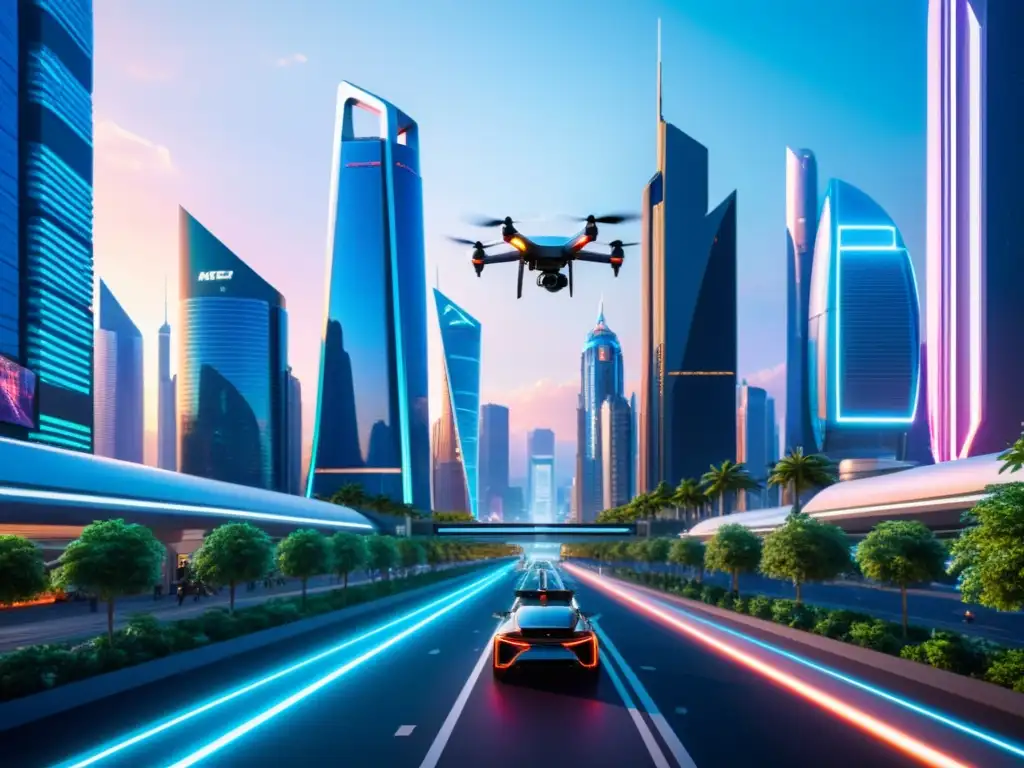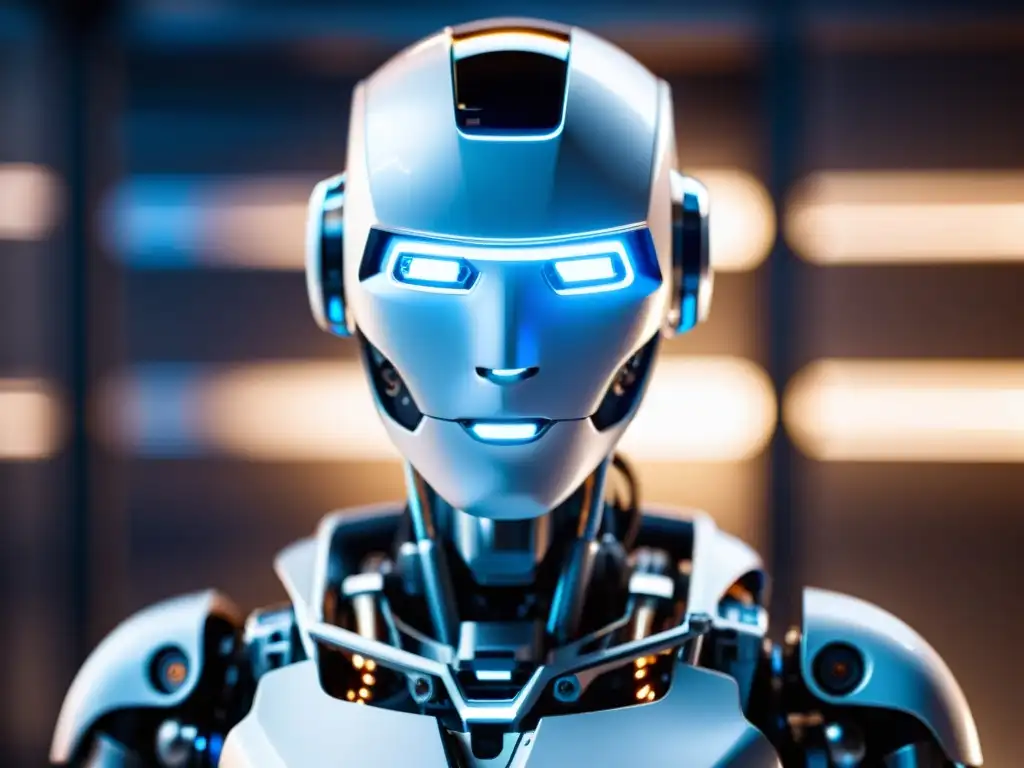The Singularity Is Near: What Does It Mean for Humanity?
Introduction to Technological Singularity

What is Technological Singularity?
The Technological Singularity is a concept that refers to the moment when artificial intelligence will surpass human intellectual capacity, generating radical and unpredictable changes in society. This idea was popularized by futurist Ray Kurzweil, who predicts that this milestone will be reached around 2045.
According to Kurzweil, this exponential technological advancement will bring about the fusion of humans and machines, the creation of higher intelligences, and the resolution of problems currently insurmountable to humanity. The Technological Singularity, therefore, represents a turning point that will mark a before and after in human history, with profound implications for all aspects of life.
The notion of Technological Singularity has sparked passionate debate among experts, philosophers, and scientists, who discuss its ethical, social, and economic implications, as well as the possible scenarios that could arise from this momentous event.
Background and evolution of the Technological Singularity
The concept of Technological Singularity is rooted in the observation of the rapid advancement of technology and artificial intelligence over the past few decades. As AI systems have become more sophisticated and capable of performing increasingly complex tasks, the idea that they will eventually surpass human intelligence has gained traction.
The term "singularity" is taken from physics, where it denotes a point at which known rules no longer apply. Similarly, the Technological Singularity represents a point at which our current concepts of progress, intelligence, and society could become obsolete.
Throughout history, various technological milestones have brought humanity closer to the possibility of the Singularity, such as the development of quantum computing, advances in natural language processing, and machine learning, among others.
Importance of Technological Singularity Today
The Technological Singularity is a topic of utmost relevance today, as its potential impact on society, the economy, and ethics is immense. As we approach the date projected by Kurzweil, it is crucial that society as a whole and leaders in the scientific, political, and business spheres consider the implications of the arrival of the Singularity.
The discussion about the Technological Singularity has also led to increased scrutiny of the ethics of artificial intelligence development, data privacy, cybersecurity, and the impact on the labor market. Furthermore, there is a need to establish regulatory frameworks that guide the development of AI in a responsible and safe manner, to ensure that the benefits far outweigh the potential risks.
The Technological Singularity represents an unprecedented challenge and opportunity for humanity, and its proper understanding and management are crucial to ensuring a future in which technology benefits society as a whole.
Impact of the Singularity on Humanity

Transformation of society and the economy
The arrival of the technological singularity, marked by the rise of superintelligent artificial intelligence, will have an unprecedented impact on society and the economy. The widespread automation of tasks, process optimization, and the creation of new ways of working will be just some of the areas affected. Much of the current workforce is expected to be displaced by automation, requiring a reinvention of economic and social models. Furthermore, the technological singularity could generate a new kind of inequality, where those with advanced digital skills have a significant advantage over others.
This transformation could also lead to the creation of new economic opportunities, such as specialized jobs in the development and maintenance of artificial intelligence, as well as in the implementation of emerging technologies in different sectors. Furthermore, process optimization thanks to AI could lead to greater efficiency in the production and distribution of goods and services, potentially benefiting the global economy.
Technological singularity will bring with it a profound reconfiguration of society and the economy, with challenges and opportunities that will require innovative responses and adaptation to a new technological paradigm.
Ethical and moral implications
The move toward technological singularity raises a series of ethical and moral questions that must be carefully addressed. The creation of superintelligent artificial intelligence poses challenges in terms of liability, as it raises the question of who would be responsible if the AI made decisions with significant consequences. This question raises the need to establish robust regulatory frameworks to guide the development and use of artificial intelligence.
On the other hand, technological singularity also raises questions about the relationship between humans and machines, as well as the very concept of consciousness and autonomy. The possibility of artificial intelligence developing its own consciousness and morality raises complex ethical dilemmas that require deep reflection and ongoing dialogue among experts in ethics, philosophy, and technology.
Technological singularity demands a detailed analysis of the ethical and moral implications of the creation and use of superintelligent artificial intelligence, in order to ensure that its development and application are consistent with humanity's fundamental values.
Challenges and opportunities for humanity
The arrival of the technological singularity poses significant challenges for humanity, but it also offers opportunities to address global problems more effectively. Among these challenges are the need to rethink education systems to prepare future generations for a workplace transformed by AI, as well as the creation of policies that address inequality and the social impact of automation.
On the other hand, technological singularity also offers opportunities to solve global challenges, such as climate change, healthcare, and sustainability. The application of artificial intelligence in natural disaster prediction, medical research, and resource optimization could lead to significant advances in solving problems that affect humanity as a whole.
The technological singularity poses complex challenges, but also offers opportunities to address global problems in innovative and effective ways, requiring a thoughtful and collaborative approach to ensure humanity can fully realize the potential of superintelligent AI.
The Singularity and Artificial Intelligence
Technological Singularity is a concept that has gained significant relevance in the field of artificial intelligence and emerging technologies. This term, coined by futurist Ray Kurzweil, refers to the moment when machines will surpass human intelligence, generating exponential and uncontrollable change in society and in the very nature of humanity.
Artificial Intelligence (AI) is a fundamental pillar in the discussion about the Singularity. With significant advances in machine learning, natural language processing, computer vision, and other areas, AI is bringing the time when machines could match and even surpass human cognitive capabilities ever closer. This advancement raises ethical, social, and philosophical questions about the impact of AI on society and on the very existence of humanity.
The relationship between the Singularity and Artificial Intelligence poses unprecedented challenges and opportunities. While some experts envision a utopian future where AI will enhance human creativity and solve fundamental problems, others warn of the risks of uncontrolled artificial superintelligence. A thorough understanding of these concepts and their implications is vital to anticipating and guiding the development of technology responsibly and consistent with human values.
Development of Emerging Technologies Towards the Singularity

Advances in Artificial Intelligence and its relationship with the Singularity
Artificial Intelligence (AI) has experienced significant advances in recent decades, leading to the creation of systems capable of autonomous learning, reasoning, and decision-making. These advances in AI are closely related to the concept of the Singularity, a hypothetical moment in the future in which AI will surpass human intelligence, generating a radical impact on society and humanity as a whole.
Developments in AI are closely linked to the quest to create conscious and superintelligent machines, which poses ethical, philosophical, and technical challenges. The Singularity represents a momentous milestone in the development of AI, and its eventual arrival carries both promise and concerns regarding its impact on society and humanity.
Advances in AI, especially in the fields of deep learning and natural language processing, are bringing the possibility of achieving the Singularity ever closer, raising the need to reflect on the implications of this scenario for humanity.
Innovations in robotics and automation
Robotics and automation are areas of technological development that have experienced exponential growth in recent years. The creation of increasingly sophisticated and autonomous robots, as well as the implementation of automated systems in various sectors, are having a significant impact on society and the economy.
The convergence of robotics with AI has driven the creation of robots with cognitive and adaptive capabilities, raising the possibility that in the near future, robots could play increasingly complex roles in diverse areas, from healthcare assistance to industrial and service tasks.
These innovations pose challenges and opportunities for society, generating debates around the ethics of robotics, the impact on employment, and the need for regulations that ensure responsible and sustainable technological development.
Applications of biotechnology and nanotechnology
Biotechnology and nanotechnology are fields of research that are revolutionizing the way we understand and manipulate matter at the molecular and genetic levels. These emerging technologies have the potential to radically transform sectors such as medicine, energy, manufacturing, and computing, among others.
The application of biotechnology and nanotechnology poses challenges and opportunities in areas such as regenerative medicine, the production of advanced materials, early disease detection, and the development of new forms of sustainable energy. However, it also raises concerns regarding biosecurity, the ethics of genetic manipulation, and the environmental impact of nanotechnology materials.
The advance of biotechnology and nanotechnology toward the Singularity raises questions about the responsible use of these technologies, as well as the need to establish regulatory frameworks that allow for their development in an ethical and safe manner for society and the environment.
How to Prepare for the Singularity?

Considerations for regulation and governance
Given the imminent arrival of technological singularity, it is crucial that governments and regulatory bodies begin developing legal and regulatory frameworks to guide the use and development of emerging technologies. Artificial intelligence, machine learning, and automation pose new ethical, legal, and security challenges that must be addressed promptly. Regulation is needed to ensure transparency, fairness, and accountability in the use of these technologies, protecting individual and collective rights.
The governance of emerging technologies must also consider international collaboration, as singularity knows no borders. Agreements and protocols are needed to promote cooperation between countries to address the global challenges that arise with the arrival of unprecedented technological advances.
The creation of specialized commissions, the updating of laws, and the active participation of society in the development of these regulations will be fundamental aspects to effectively address the impact of singularity on humanity.
Skills development and educational training
The arrival of technological singularity will require a profound transformation in the labor market, making it imperative to develop skills that match the new demands. Educational institutions and training programs must adapt to include knowledge in artificial intelligence, programming, cybersecurity, and other disciplines related to emerging technologies.
Furthermore, it is essential to foster critical thinking, creativity, and problem-solving skills, which will be highly valued in an environment dominated by automation and AI. Continuous training and lifelong learning will be essential for individuals to stay up-to-date and competitive in a context of constant technological evolution.
Likewise, it is crucial to ensure accessibility to technology education and promote diversity in this field, encouraging equitable participation of gender and underrepresented groups in the technology industry.
Impact on decision-making at global and local levels
Technological singularity will have a significant impact on decision-making at the global and local levels. Data processing capabilities, predictive analytics, and task automation will influence policymaking, resource management, and strategic planning in various areas.
It is essential to ensure that the implementation of emerging technologies in decision-making is transparent, ethical, and geared toward maximizing the benefit for society as a whole. Political, business, and community leaders must understand the potential and limitations of these technologies to make informed and responsible decisions.
Citizen participation in policymaking and accountability will be key to ensuring that the implementation of technological singularity in decision-making is consistent with the well-being and interests of society.
The Future with Technological Singularity

Technological singularity represents a milestone in the evolution of emerging technologies, with a potentially transformative impact on humanity. In the short term, the imminent advances and challenges pose challenges and opportunities that must be addressed with caution and strategic vision.
Short-term outlook: Progress and imminent challenges
In the next decade, artificial intelligence, biotechnology, and nanotechnology are expected to reach unprecedented levels of development. These advances will revolutionize entire industries, from healthcare to manufacturing, and will force us to rethink the ethics and regulation surrounding these technologies.
One of the imminent challenges is the creation of ethical and transparent AI systems that minimize bias and maximize benefits for society. Furthermore, bioengineering and nanomedicine raise questions about privacy and equitable access to these innovations.
It is crucial that, in the short term, solid regulatory and ethical frameworks be established to guide the development and implementation of these emerging technologies, ensuring that their impact is beneficial for humanity as a whole.
Long-term vision: Possible scenarios for humanity
On the more distant horizon, the technological singularity could lead to radically different scenarios for humanity. From the creation of artificial superintelligences to biological enhancement through nanotechnology, possibilities arise that challenge our current understanding of what it means to be human.
One potential scenario is the emergence of a post-biological society, in which the fusion between humans and machines is so profound that the very notion of humanity is redefined. Another scenario is interplanetary colonization, facilitated by advances in space exploration and genetic engineering to adapt humans to extraterrestrial environments.
Regardless of the scenario that materializes, it is critical that humanity approach these potential developments with a thoughtful and ethical perspective, ensuring that technological singularity contributes to the improvement and preservation of the human condition.
Conclusions on Singularity and Humanity

Final thoughts on impact and implications
The arrival of the Technological Singularity raises a series of profound reflections on its impact on humanity. On the one hand, it envisions unprecedented potential for scientific advancement, the resolution of global problems, and improved quality of life. However, concerns also arise about massive job displacement, the digital divide, and overdependence on technology.
It is crucial to consider the psychological and social impact the Singularity could have on people, as the rapid evolution of technology can generate anxiety, uncertainty, and significant cultural change. Furthermore, it is necessary to reflect on ethics and responsibility in the development and use of advanced technologies, ensuring that they are applied fairly and equitably for the benefit of all humanity.
Ultimately, the Technological Singularity represents a crucial milestone in human history, requiring careful consideration of its implications at the individual, societal, and global levels.
Considerations for the evolution of society in the face of the Singularity
With the imminent arrival of the Technological Singularity, it is essential that society prepare to face the challenges and seize the opportunities that will arise. Education plays a fundamental role in this process, as it must adapt to foster skills such as critical thinking, complex problem-solving, and creativity, which will be essential in a constantly evolving technological environment.
Furthermore, governments and organizations must establish policies and regulations that promote inclusion, equity, and the protection of human rights in the context of the Singularity. It is necessary to ensure that the benefits of emerging technologies are distributed fairly and that no one is left behind in this new technological paradigm.
International collaboration and interdisciplinary dialogue will be essential to address the ethical, legal, and social challenges that arise with the arrival of the Singularity. It is time to work together to build a future in which technology serves as a tool for human progress, without neglecting the values and empathy that make us truly human.
Frequently Asked Questions
1. What is singularity in the context of emerging technologies?
The singularity refers to the hypothetical moment in the future when emerging technologies will reach a level of intelligence and capability that will have a momentous impact on humanity.
2. What are some emerging technologies that could contribute to the singularity?
Emerging technologies that could contribute to the singularity include artificial intelligence, nanotechnology, biotechnology, and quantum computing .
3. What are the possible implications of singularity in society and everyday life?
The singularity could have a significant impact on society, including changes in employment, healthcare, ethics, privacy, and human-machine relationships .
4. How are experts preparing for the singularity and its implications?
Experts are working in fields such as AI ethics , cybersecurity, disruptive technology law , and risk management to address the implications of the singularity.
5. Should we be concerned about the arrival of the singularity and its effects on humanity?
It's important to monitor developments related to the singularity, as it could have a profound impact on humanity. However, it's also an opportunity to shape the future through informed and ethical decisions.
Final Reflection: The Technological Singularity and its Impact on Humanity
The arrival of the Technological Singularity is more relevant than ever today, as we are witnessing unprecedented advances in the development of emerging technologies that will transform our reality in unimaginable ways.
This impact will continue to shape not only our environment, but also how we interact, learn, and grow as a society. "Technology is just a tool. In terms of getting children to work together and motivating them, the teacher is the most important resource" - Bill Gates.
It's crucial to reflect on how we can embrace these changes consciously and ethically, preparing for a future where collaboration between humans and technology is fundamental to progress and collective well-being.

Publicar un comentario